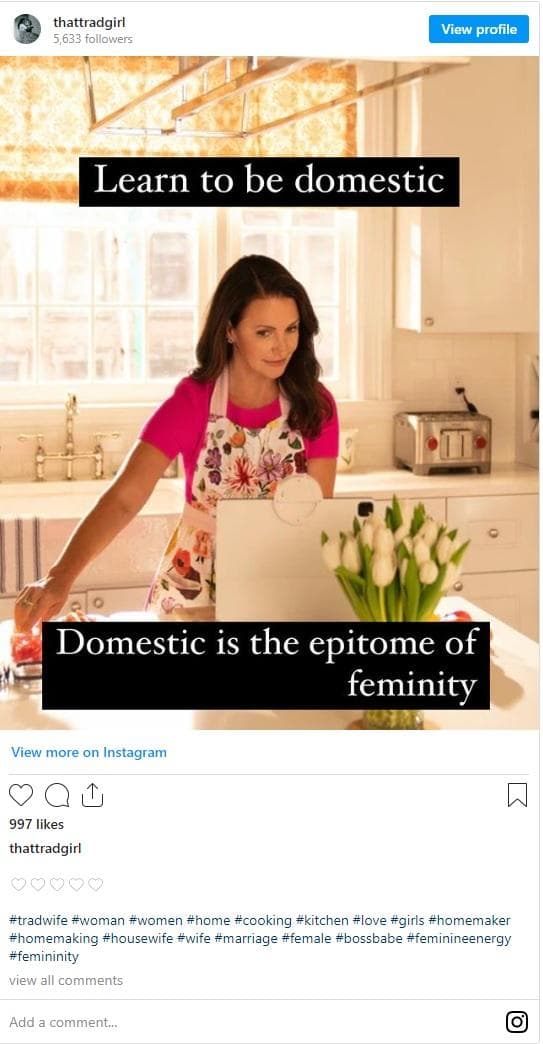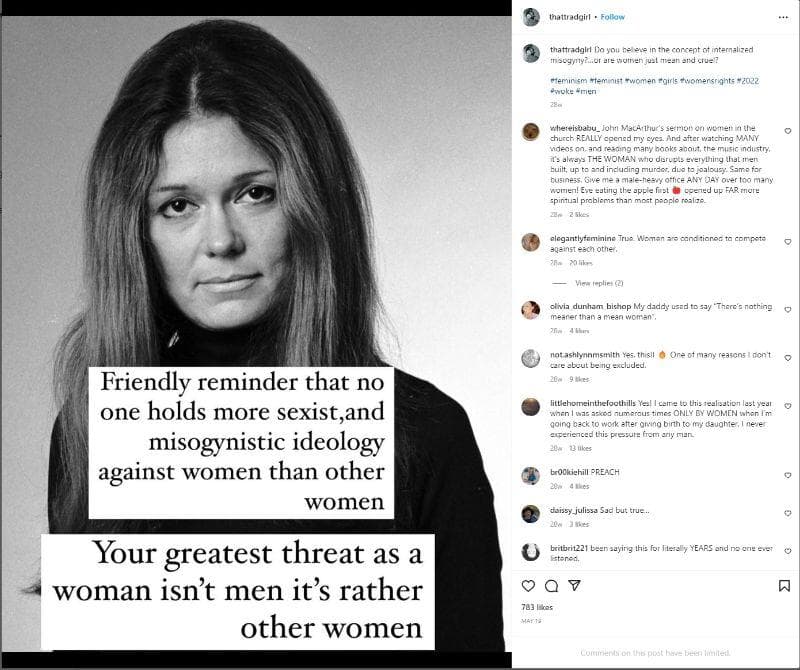The Real Tradwives of Facism
Bronwyn Rideout (December 5, 2022)
Cottagecore, but make it alt-right
In her “purest form”, a traditional wife (or the more hashtaggable Tradwife) is a woman who takes a traditional gender role in their marriage and household, and forgoes a career to focus on their family and raising children. One could be forgiven for wondering what makes tradwives different from housewives, for which the answer is the emphasis placed by tradwives on submission to their husband, as well as a heavy dose of 1950s aesthetics or rural landscapes, along with a variety of homey and benign hashtags like #homemaker or #cooking, and the occasional scripture if Jesus is on your speed dial.
As Frankie Sitler-Elbel puts it, the motivation of a tradwife is that she must cater to her husband in these way while the housewife (and her parallel, the househusband) act in accordance to their situation and what they and their family need. Within this ideology, a tradhusband cannot take on the homemaking duties, but instead is the head of the household and breadwinner.

I'm not dogging on anyone who truly wants to stay at home, be a homemaker, and raise a baseball team worth of kids if that's their choice. Traditional wives are certainly not a new concept, but their visibility on social media as #tradwives is a recent phenomenon. In particular, visual social media platforms like TikTok, YouTube, and Pinterest are where #tradwives proliferate, with videos about sourdough starters and homemade sewing. Where my interest lies is in how some of the more nefarious individuals and groups use those surface level aesthetics to attract young women and young men, and indoctrinate them with far-right dog whistles.
One side of the slippery slope is the anti-feminist rhetoric. Consider the previous image: Your mileage may vary about domesticity and femininity, but it isn't overtly controversial. However the messages from these pages can escalate:

Much ink has been spilt, and electrons used, in explaining why capitalism and the partriarchy, and not feminism, actually underwrites the criticism that Tradwives and Tradfems have about the modern lives of women. It's hard to find an article on this topic that neglects to point out that the good ol' days that Tradwives wish to emulate was limited to a lucky few. As Annie Kelly puts it in her New York Times article, they wish for a “mythic past of material abundance” where most women, non-white, and LGBTQIA+ need not apply. It's a decidedly Christian, privileged, and homogenous world.
For members of far-right and fascist organisations, as Kelly investigated in the same article, this is the society they want - if it weren't for their little misogyny problem. You can't continue and grow the white race without having white women who want to have white babies with you; even so-called shield maidens and fashy femmes have (questionable) standards. Nancy Love writes that women in white supremecist movements often fly under the radar of the media and academia, but are no less active participants than the guys. By adopting a hyperfeminine identity and building an online presence, they soften and normalise the abhorrent beliefs of the alt-right through the norms of audience engagement and parasocial relationships i.e. promoting make-up and fashion, or posting how-to lists and videos on being feminine. Stuck between the recipes for apple pie and how-to smock making videos are gradual introductions to the works of extremist thinkers and ideas; some influencers admit that they do this as a way to pad out messages they know are more intense.
Young women who are lost, lonely, and seeking connection as they scroll through TikTok are vulnerable to this predatory messaging. Researchers note that extremist movements are successful in simplifying our complex world, and prominent figures in the alt-right movement like Lana Lokteff acknowledge that the online tradwife movement has potential as a recruitment tool.

Intersecting with tradwives is Cottagecore. Cottagecore is an aesthetic that romaticises western agricultural life that influencers may use to guide their visual content such as videos, pinterest boards, and tumblr themes. Like tradwives, cottagecore is generally benign at its core, but it can be taken to darker dimensions. Cottagecore is an especially eurocentric perspective that is less about sustainability and reduction of consumption, and leans more into colonialism and eco-facist/nationalist themes. While alt-right and conservative trad wives do use rural settings in their content, they misrepresent the realities of economic and working life in these regions.
In typical New Zealand news outlet fashion, a recent Stuff article on Tradwives sidestepped the white supremacy angle in favour of the Housewife vs Career Woman angle. This is a troublesome oversight given the activities of extremists groups in this country over the past year. Time will tell if this trend will fall apart from within, or mutate into something new altogether.
